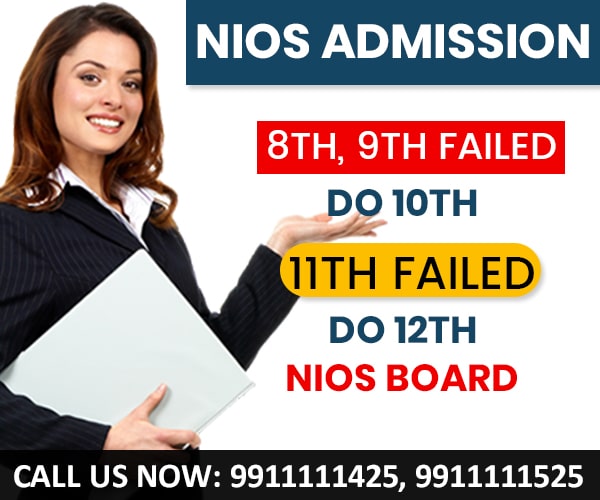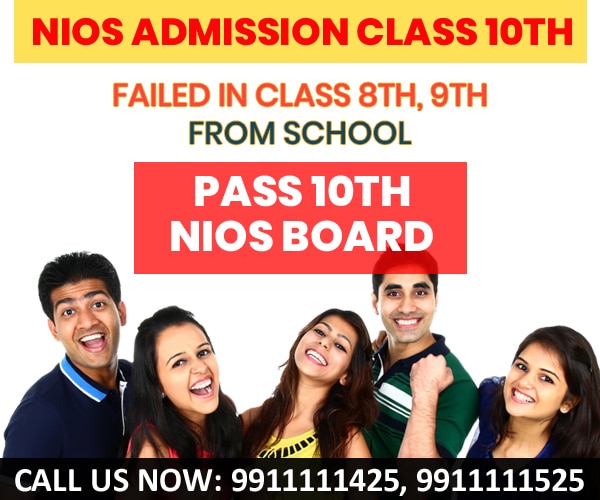Nios Admission 2025 to Complete Schoolling for classes 10th, 12th

Nios admission 2025: The National Institute of Open Schooling the NIOS board, formerly known as the National Open School (NOS), has played a pivotal role in transforming the education landscape in India. Established in 1989, NIOS has been at the forefront of providing flexible and inclusive education opportunities to learners nationwide. In this blog, we take a closer look at NIOS’s history, tracing its evolution and impact on the education system in India. The National Institute of Open Schooling (NIOS) has pioneered education in India, making it more inclusive, accessible, and learner-centric. As NIOS continues to innovate and expand its reach, it is poised to shape the future of education in the country.
Early Beginnings of Nios board:
- Open schooling in India can be traced back to the 1970s when the government recognized the need for alternative education options to reach out to marginalized and disadvantaged groups.
- The National Open School, the NOS board, was established in 1989 by the Government of India Ministry of Human Resource Development (MHRD) to provide flexible and learner-centric education to students who could not attend regular schools.
Evolution and Expansion of Nios board:
- In 2002, NOS was rechristened as the National Institute of Open Schooling (NIOS) to reflect its broader mandate and vision for open and distance learning.
- Over the years, NIOS has expanded its reach and offerings, providing education at the secondary (Class 10) and senior secondary (Class 12) levels as well as vocational and life enrichment courses.
Recognition and Accreditation of Nios board:
- The Government of India recognizes NIOS certificates equivalent to those issued by other recognized boards such as CBSE and ICSE.
- NIOS is also a member of prestigious international institutions such as the Commonwealth of Learning, the COL, the ICDE, and the International Council for Open and Distance Education.
Impact and Reach of Nios board for school education:
- NIOS has had a significant impact on the education system in India, especially in reaching out to marginalized and disadvantaged groups such as girls, rural students, and students with disabilities.
- The flexibility and accessibility offered by NIOS have enabled thousands of students to complete their education and pursue higher studies or enter the workforce.
Innovative Initiatives:
- NIOS has also launched digital initiatives such as the NIOS-Diksha platform, which provides digital learning resources to students and teachers.
Future Directions:
- NIOS continues to evolve and adapt to the changing educational landscape, incorporating new technologies and pedagogies to enhance students’ learning experiences.
- The institute remains committed to providing quality education, regardless of background or circumstances.
How Students can join Nios Admission 2025 courses
The popular courses the Nios Board offers are Nios 10th class admission for secondary courses and Nios 12th class admission for senior secondary courses. Students should carefully check the eligibility criteria for admission to the above courses. They can apply for admission via the Nios online admission form. Students can choose the subjects of their interest and start school education for secondary and senior secondary classes.
Benefits of joining the Nios Admission 2025
Choosing the National Institute of Open Schooling (NIOS) board for secondary and senior secondary courses offers several benefits, making it a popular choice among students. NIOS gives students a wide range of benefits and opportunities, making it a popular choice for those seeking alternative education options in India.
Here are some reasons why students may choose NIOS:
Flexible Learning for secondary and senior secondary Classes:
NIOS offers flexible learning options, allowing students to study at their own pace and convenience. It mainly benefits students with other commitments such as work or family responsibilities.
Open and Distance Education:
NIOS provides education through open and distance learning, making it accessible to students across India, including those in remote or rural areas.
Recognition and Equivalence of Nios Courses:
NIOS certificates are recognized by the Government of India and are equivalent to those issued by other recognized boards, such as CBSE and ICSE. They enable NIOS students to pursue higher education in all the universities and colleges in India and abroad.
Diverse Subjects and Courses:
NIOS offers all subjects and courses available in CBSE and other state boards at the secondary and senior secondary levels, helping students choose classes based on their career goals and interests.
Vocational Education:
NIOS also offers vocational and academic courses, which provide students with practical skills and enhance their employability.
Examination and Evaluation:

Support Services:
NIOS provides study material, online resources, and support services to help students succeed. Students can also attend face-to-face classes at designated study centres for additional support.
Inclusive Education:
NIOS offers special initiatives and support services for differently-abled students, ensuring that education is accessible to all.
Remedial and Additional Exams:
NIOS provides opportunities for students to improve their grades through remedial exams. Students can also appear for additional exams to upgrade their marks or to clear subjects they may have failed earlier.
Skill Development:
NIOS offers skill development and regular academic courses. These courses equip students with practical skills relevant to today’s job market, enhancing their employability.
Quality Education:
NIOS is known for its quality education and comprehensive curriculum. The board regularly updates its syllabus to keep pace with changing educational trends and demands.
Cost-Effective:
NIOS education is often more cost-effective than regular schooling, as it eliminates expenses such as commuting and accommodation. The study material provided by NIOS is also cost-effective compared to traditional textbooks.
No Age Limit:
NIOS Admission does not have an upper age limit for admission, making it suitable for students of all ages who wish to complete their secondary or senior secondary education.
Board Exams Center:
NIOS allows students to choose their exam centre, providing flexibility and convenience for students who cannot travel long distances to appear for exams.
Personalized Learning:
NIOS offers personalized learning options, allowing students to choose their study schedule and pace. This customized learning approach can benefit students with different learning styles and abilities.
Career Opportunities:
NIOS opens up various career opportunities for students. Students can get admission to higher education or seek employment in government and private sectors with a recognized certificate.
Global Recognition of Nios certificates:
NIOS certificates are recognized internationally, allowing students to pursue higher education or employment abroad.
Special Focus on Disadvantaged Groups: NIOS has special provisions for students from disadvantaged groups, including girls, rural students, and students with disabilities, ensuring that education is accessible to all.
Innovative Teaching Methods: NIOS encourages using innovative teaching methods and technologies, which enhance students’ learning experience and make education more engaging and effective.
Community Engagement: NIOS promotes community engagement and social responsibility among students, encouraging them to contribute positively to society.
In conclusion, choosing the NIOS board for secondary and senior secondary courses offers students a flexible and accessible education option with recognition and equivalence to other recognized boards, making it a popular choice among students seeking alternative education options.
Dummy school in Delhi
CBSE Schools in Delhi

Dummy school in Delhi – Delhi, the bustling capital of India, is home to many educational institutions, including several Central Board of Secondary Education (CBSE) schools. With its rich history, diverse culture, and vibrant atmosphere, Delhi offers a unique educational experience for students aspiring to excel academically. In this blog, we delve into the world of CBSE schools in Delhi, exploring their history, curriculum, facilities, and the distinctive features that set them apart.
CBSE Dummy Schools in Delhi:
The CBSE is one of India’s most prestigious educational boards, known for its comprehensive and holistic approach to education. CBSE Dummy schools in Delhi follow the board’s curriculum, designed to provide a well-rounded education focusing on academic excellence and holistic development.
History and Evolution of CBSE Schools in Delhi:
CBSE schools in Delhi have a rich history that dates back several decades. Many of these schools were established during the British era and have since evolved to become centres of academic excellence. Over the years, CBSE Dummy schools in Delhi have adapted to the changing educational landscape, incorporating modern teaching methods and techniques to improve the learning experience.
Curriculum and Academic Programs:
CBSE Dummy schools in Delhi follow the board-prescribed curriculum, which includes various subjects across various disciplines. The curriculum and syllabus are designed to be comprehensive, covering core subjects such as Mathematics, Science, and Languages, as well as elective subjects that help students improve their interests and talents.
Co-curricular and Extracurricular Activities:
In addition to academics, CBSE Dummy schools in Delhi strongly emphasize co-curricular and extracurricular activities. These activities are crucial to students’ development, helping them build essential life skills such as leadership, teamwork, and communication.
Facilities and Infrastructure:
CBSE schools in Delhi are known for their state-of-the-art facilities and infrastructure, which provide students with a conducive learning environment. From well-equipped classrooms and laboratories to libraries, sports facilities, and auditoriums, CBSE schools in Delhi offer a wide range of amenities to support students’ holistic development.
Pedagogy and Teaching Methodologies:
CBSE schools in Delhi employ various teaching methodologies to cater to students’ diverse learning needs. These include interactive sessions, group discussions, project-based learning, and technology such as smart boards and educational software.
Student Support Services:
CBSE schools in Delhi offer various student support services to help students develop academically and personally. These services may include counselling, career guidance, remedial classes, and special education programs for students with learning disabilities.
Admission Process and Criteria:
The admission process for CBSE schools in Delhi varies from school to school. It is typically based on academic performance, entrance tests, and interviews. Some schools may also give preference to siblings of current students or alums.
Notable CBSE Schools in Delhi:
Delhi has several renowned CBSE schools, including DPS RK Puram, Modern School, Vasant Vihar, and Springdales School. These schools are known for their academic excellence, extracurricular achievements, and strong alum networks.
Parental Involvement and Community Engagement:
CBSE schools in Delhi often emphasize the importance of parental involvement and community engagement in the education process. Schools may organize parent-teacher meetings, workshops, and events to inform parents of their child’s growth and involve them in school activities.
Global Exposure and Exchange Programs:
Many CBSE schools in Delhi offer global exposure and exchange programs to provide students with international perspectives and experiences. These programs may include student exchanges, cultural exchanges, and collaborations with schools and institutions abroad.
Focus on Skill Development and Career Readiness:
CBSE schools in Delhi strongly emphasize skill development and career readiness, preparing students for success in their future endeavours. Schools may offer vocational courses, career counselling, and internships to help students explore their interests and talents.
Emphasis on Values and Ethics:
CBSE Dummy school in Delhi often focus on instilling values and ethics in students, emphasizing the importance of honesty, integrity, and social responsibility. Schools may incorporate value-based education programs and activities to promote these qualities among students.
Challenges and Opportunities:
While CBSE schools in Delhi offer a high standard of education, they also face challenges such as maintaining infrastructure, keeping up with technological advancements, and ensuring inclusive education for all students. However, these challenges also allow schools to innovate and improve their offerings.
CBSE Dummy school in Delhi offer a unique educational experience combining academic rigour and holistic development. With its comprehensive curriculum, state-of-the-art facilities, and focus on co-curricular activities, CBSE schools in Delhi are the ideal choice for students seeking a well-rounded education that prepares them for success in the modern world.
CBSE schools in Delhi play a crucial role in shaping the future of India by providing quality education and improving the talents of young minds. With their comprehensive curriculum, state-of-the-art facilities, and focus on holistic development, CBSE schools in Delhi continue to set the benchmark for excellence in education.


